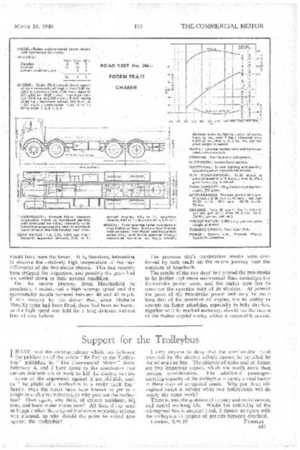Support for the Trolleybus
Page 19

If you've noticed an error in this article please click here to report it so we can fix it.
HAVE read the correspondence which has followed I the publication of the article " Re Fair to the Trolleybus," published in "The Commercial Motor" dated February 4, and I have come to the conclusion that certain interests are at work to kill the electric vehicle.
Some of the arguments against it are childish, such as " the plight Of a trolleybus in a really thick fog." Surely, even the buses have been known to get in a tangle in such circumstances, so why pick out the trolleybus? Then again, why think of serious accidents, big fires, and burst water mains now? All these things used to happen when the original trolleybus extension scheme was planned, so why should the point be raised now against the trolleybus? I defy anyone to deny that the comfortable travel provided by the electric vehicle cannot be equalled by the oil-engined bus. The absence of noise and oil fumes are two important aspects which are worth more than passing consideration. The additional passengercarrying capacity of the trolleybus is surely a vital factor in these days of congested roads. Why put three oilengined buses in service when two trolleybuses will do nearly the same work'?
There is, too, the question of upkeep and maintenance, and useful working life. Whilst the reliability of the oil-engined bus is unquestioned, it cannot compare with the trolleybus in respect of periods between overhaul.
London, S.W.19. FAIRPLAY.


























